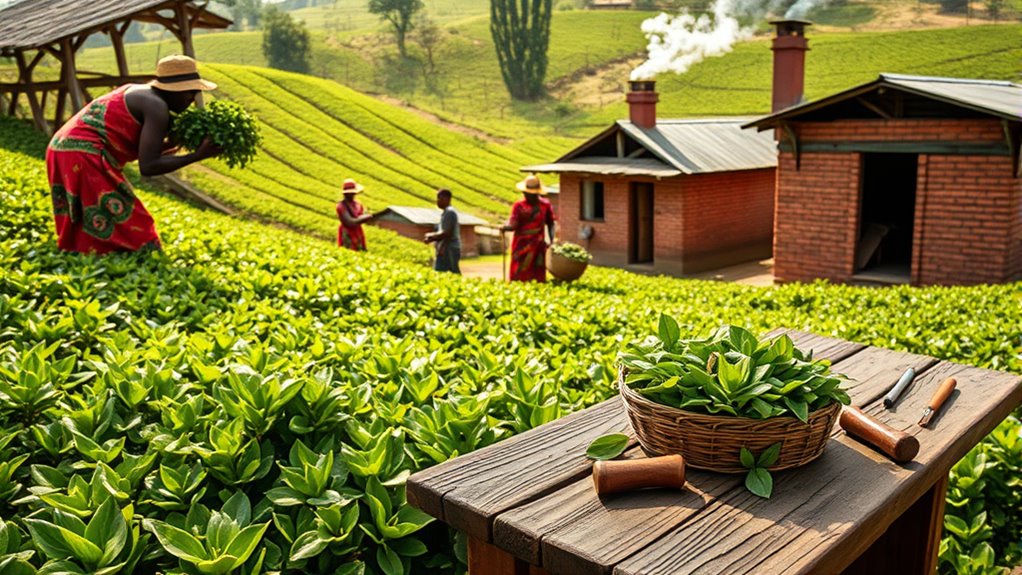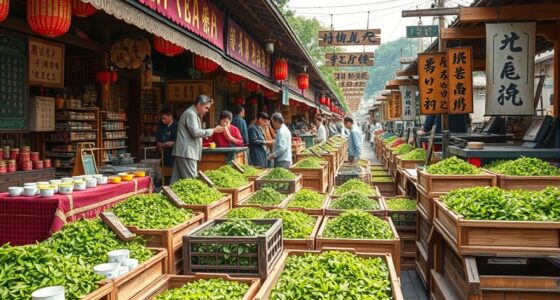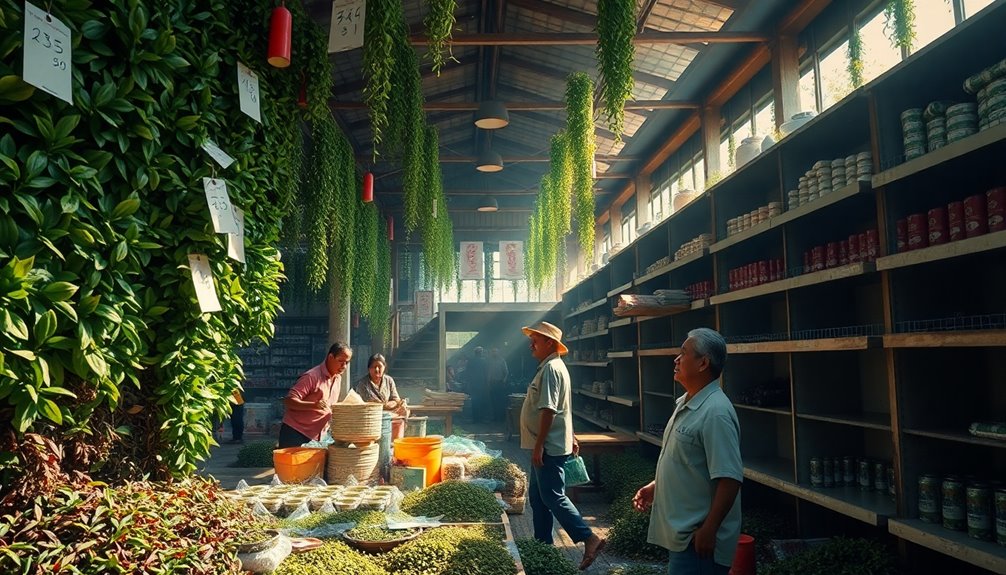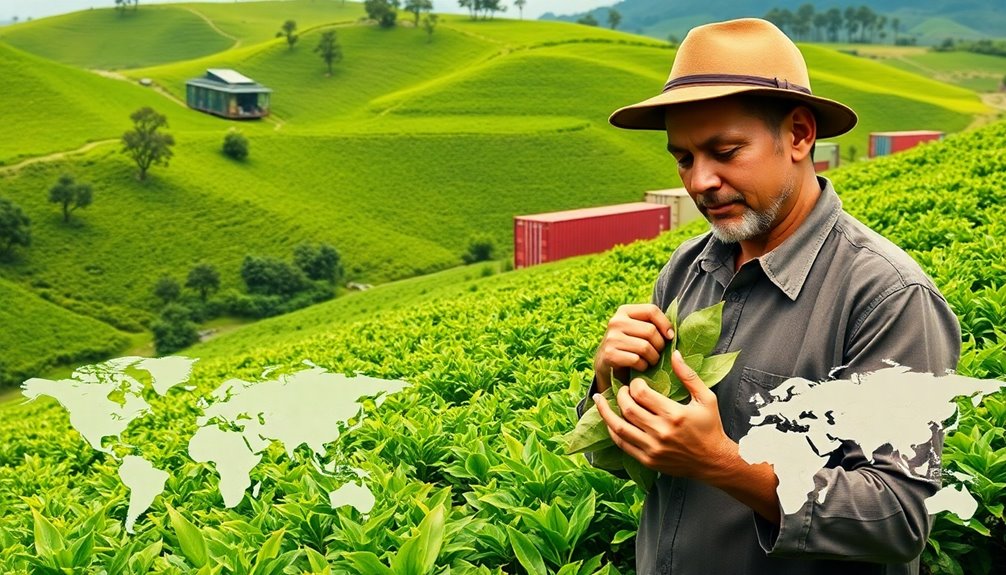Fair-trade tea cooperatives in Rwanda help small farmers earn better incomes by connecting them directly with international buyers and ensuring fair prices. These cooperatives promote ethical practices, transparency, and collective bargaining, which improves market access and stabilizes livelihoods. They also offer training and support, helping farmers meet quality standards and access premium markets. If you want to understand how these cooperatives foster sustainable development and economic growth, there’s more to explore.
Key Takeaways
- Fair-trade cooperatives ensure better prices and working conditions, increasing farmers’ incomes and economic stability in Rwanda.
- Democratic governance and transparency prevent corruption, fostering trust and fair benefit sharing among cooperative members.
- Access to international markets and direct buyer connections enable premium pricing and ethical sourcing opportunities.
- Capacity building and training improve cultivation practices, quality standards, and market competitiveness for farmers.
- Strong governance and market expansion promote sustainable livelihoods and resilience within Rwanda’s tea farming communities.
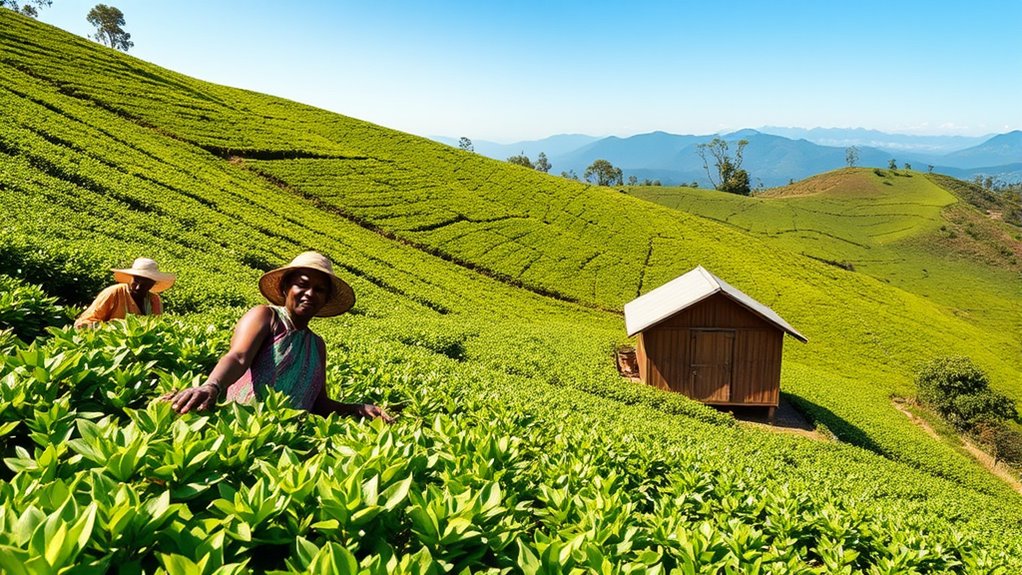
Fair-trade tea cooperatives play an essential role in empowering small-scale farmers by ensuring they receive fair prices and better working conditions. When you participate in a cooperative, you gain access to markets that might otherwise be out of reach. Instead of selling your tea to middlemen at low rates, the cooperative helps you connect directly with international buyers who value ethical sourcing and fair trade practices. This improved market access means you can command higher prices for your tea, which translates to increased income and a more stable livelihood. The cooperative acts as a collective bargaining unit, giving you a stronger position to negotiate terms and prices, guaranteeing you’re not left vulnerable to unfair pricing schemes.
Beyond market access, cooperative governance plays a critical role in maintaining transparency and fairness within the organization. When you’re part of a well-managed cooperative, decisions are made collectively, giving you a say in how the organization operates. This democratic approach helps prevent corruption or favoritism, ensuring that benefits are shared equitably among members. Good governance also fosters accountability, which reassures buyers that your tea is produced ethically and sustainably, often leading to better market opportunities and premium prices. As a member, you’re encouraged to participate in decision-making processes, from setting prices to determining quality standards, strengthening the cooperative’s overall effectiveness and sustainability. Additionally, the integration of cybersecurity measures within the cooperative’s operations can help protect sensitive data related to transactions and member information, further enhancing trust and efficiency.
The governance structure within your cooperative also provides support systems, such as training, access to resources, and shared knowledge. These elements help you improve your cultivation practices, increase productivity, and meet international quality standards—all of which are essential for securing premium prices in the global market. The cooperative’s leadership ensures that you’re kept informed about market trends and fair-trade requirements, so you can adapt accordingly. This collective approach not only benefits individual farmers but also enhances the reputation of the cooperative, attracting more buyers who trust the integrity of your tea.
In Rwanda, the success of fair-trade tea cooperatives hinges on strong governance and expanded market access. When these components work together, they create a sustainable economic model that elevates farmers’ livelihoods while promoting ethical production practices. You, as a farmer, stand to gain greatly from the cooperative’s efforts, enjoying higher earnings, better working conditions, and a voice in the decision-making process. By strengthening both market access and governance, the cooperative helps you build a resilient, prosperous future rooted in fair trade principles.
Frequently Asked Questions
How Do Fair-Trade Premiums Affect Local Community Development?
Fair-trade premiums directly boost community development by providing additional income for local projects and infrastructure. When you support fair trade, you help guarantee these premiums are invested back into the community, improving education, healthcare, and living standards. This creates a positive cycle where increased profits lead to better community resources, empowering residents and fostering sustainable growth. Your purchasing choices can make a real difference in enhancing local development through fair-trade premiums.
What Are the Environmental Impacts of Tea Cooperatives in Rwanda?
Like a guardian of the land, your tea cooperative impacts Rwanda’s environment. You help reduce soil erosion through sustainable farming practices, preserving the earth beneath your feet. By prioritizing biodiversity preservation, you protect native species and maintain ecological balance. Your efforts ensure that the lush landscapes remain vibrant and resilient, symbolizing a harmonious relationship between community development and environmental stewardship, ultimately nurturing Rwanda’s natural heritage for generations to come.
How Do Fair-Trade Standards Influence Cooperative Management Practices?
Fair trade standards shape how you manage cooperatives by emphasizing management transparency and ethical practices. When your cooperative earns fair trade certification, you’re encouraged to adopt transparent decision-making, guarantee fair wages, and prioritize sustainable methods. These standards motivate you to build trust with members and buyers, fostering a responsible management approach. Ultimately, fair trade certification guides you to operate ethically and sustainably, benefiting both your cooperative and the environment.
What Is the Long-Term Sustainability of Fair-Trade Tea Cooperatives?
Imagine a sturdy tree rooted deeply, symbolizing the long-term sustainability of fair-trade tea cooperatives. You strengthen this tree by promoting farmer empowerment and encouraging market diversification, ensuring resilience against economic storms. With empowered farmers making informed decisions and diversifying markets, the cooperatives can thrive for years. This sustainable growth nurtures communities, preserves traditions, and guarantees a steady future, much like a thriving tree providing continuous shade and fruit.
How Do Global Market Fluctuations Impact Small-Scale Rwandan Tea Farmers?
You’ll notice that market volatility and price instability heavily impact small-scale Rwandan tea farmers. As global market fluctuations occur, prices can drop unexpectedly, making it hard to plan or invest confidently. You might see income uncertainty, which affects your ability to cover costs or improve your farm. These fluctuations highlight the vulnerability of small farmers to external economic changes, emphasizing the need for resilient strategies to manage market risks.
Conclusion
You might think fair-trade cooperatives process costs outweigh their benefits, but they genuinely empower farmers and promote sustainable growth. By ensuring fair prices and better working conditions, these cooperatives create a more stable income source, helping communities thrive long-term. Don’t overlook the importance of fair trade; it’s not just about ethics but about building resilient, prosperous local economies. Your support can make a real difference in transforming lives through equitable trade practices.

